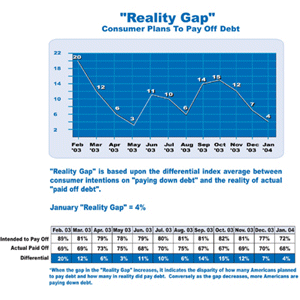January 03, 2004
Bankruptcy & Debt: New Year's Resolutions & the Christmas Spending Hangover Worse Than Ever
 "It's the week after Christmas and there's worry about... the savings are empty and credit's maxed out."
"It's the week after Christmas and there's worry about... the savings are empty and credit's maxed out."
Don’t blame me, I borrowed that…
But, speaking of borrowing, financial anxiety isn't supposed to be part of the holiday tradition. Neal Conan and his guests talked recently about why bankruptcy and foreclosures are on the rise and the outlook for some is worse than usual. Part of the explanation is that credit card marketshare is a lot tighter these days – about 75 percent of consumer debt is held by just five banks; 20 years ago, it would’ve taken 25 banks to support that amount of debt. So, listen in online – it’s a good discussion.

Meanwhile, I did a little research and found some details from Cambridge Consumer Credit Index about the goal of getting out of debt having taken top priority among New Year’s Resolutions.
-
More than one quarter (28%) of all Americans say getting out of debt is their top New Year's resolution, closely followed (27%) by the perennial favorite of losing weight and exercising more, according to the Cambridge Consumer Credit Index. In January 2003, losing weight and getting out of debt were tied at 29%. In January 2002, losing weight was the top resolution of 30% of Americans versus 28% whose first priority was reducing debt.
This year, 15% want to get a more secure or better job, up by 4 percentage points from 2003. 13% want to improve their personal relationships, up by two points from 2003. Only 7% plan to reduce drinking and smoking, down by 4 percentage points from last year.
"This is the first time in the history of the Cambridge Consumer Credit Index that more Americans say that reducing debt is a higher priority than losing weight or exercising more. These results provide ample testimony to the increasingly heavy burden that debt is perceived to be by American consumers who continued to take on billions of dollars in additional credit in 2003. The large increase in a desire for more secure employment also shows that, despite many signs of economic growth, many Americans still do not feel secure in their jobs," says Jordan Goodman, spokesperson/financial analyst for the Cambridge Consumer Credit Index.
According to Chris Viale, Chief Operating Officer, Cambridge Credit Counseling Corporation, "At the beginning of each new year we see an increase in calls from consumers seeking help in eliminating debt. It is reassuring to know that many people don't just resolve to improve their financial lives, but take the necessary steps to make it happen. At Cambridge Credit, we urge consumers to make debt reduction a top priority and include all of their debt obligations in the budget forecasts that they may be developing for 2004."
These findings are the result of monthly nationwide telephone poll of 1000+ adults conducted by ICR/International Communications Research in the past week, sponsored by the Debt Relief Clearinghouse.
The overall Cambridge Consumer Credit Index dropped by six points from December to 59. The Index rose in one of the three composite questions. The "Reality Gap," which is the difference between the amount of debt consumers say they will pay off in the next month versus the amount of debt they actually paid off a month later, narrowed to 4 percentage points from 7 points in December. That is just one point higher than the all-time low of 3 points reached in May 2003. A month ago, 72% of Americans planned to pay off debt, while a month later 68% actually did so.
The Cambridge Consumer Credit Index is a forward looking economic indicator gauging consumer spending and debt. It is released on the fifth business day of every month to coincide with the Federal Reserve Board's G19 release of consumer credit outstanding data.
In conjunction with the Index, the Cambridge Credit Counseling Corp. is releasing its monthly survey of people who have called in for credit counseling services over the past month. Cambridge representatives ask callers for the primary reason that they found it necessary to get help with their debts now. Of the 570 people who answered, this was the order of their responses:
1. I am frustrated with high bank rates and fees (33.3%)
2. My income has been reduced from a lower salary, less overtime or layoff (23.3%)
3. I want to improve my ability to achieve future financial goals like buying a house or saving for retirement (11.8%)
4. Other reasons (8.2%)
5. My lack of financial education caused me to take on too much debt (8.2%)
6. I got into too much debt by overspending (6.8%)
7. Large medical expenses forced me to take on huge debts (5.8%)
8. My recent divorce or widowhood forced me to take on large debts (2.5%)
The Cambridge Consumer Credit Index number is a composite of these three questions:
1. In the past month, have you taken on more debt or paid off debt?
The Index reads 64 on this question, an increase of four points from December.
In January, 32% of Americans say they have taken on more debt, with 21% taking on a little and 12% taking on a lot more debt. Conversely, 68% of Americans have paid off debt, with 51% paying off a little and 17% paying off a lot.
2. In the next month, do you anticipate taking on more debt or paying off debt?
The Index reads 42 on this question, a drop of fourteen points from December. In January, 21% plan to take on more debt, with 5% planning to take on a lot and 16% planning to take on a little debt. Conversely, 79% plan to pay off debt, with 59% paying off a little and 19% paying off a lot. In December 28% planned to take on debt and 72% planned to pay off debt.
3. In the next six months, do you expect to take on debt because you are thinking of making a major purchase such as a car, education, appliance, medical procedure, furniture or carpeting?
The Index reads 72 on this question, a drop of six points from December. In January, 36% of Americans plan to take on more debt to make such purchases, with 10% taking on a lot of debt and 26% taking on a little more debt. In contrast, 64% of Americans plan to pay off debt in the next six months, with 43% expecting to pay off a little and 21% expecting to pay off a lot. In December 39% of Americans planned to take on more debt, while 61% planned to pay off debt.
"The results of the Cambridge Consumer Credit Index survey indicate that consumers are planning to cut back on their use of credit, as is to be expected after the holiday spending spree. But it is interesting to note that the cutback in planned use of credit in the next month is far less severe than a year ago when the economy was much weaker and uncertainty over the potential war with Iraq was still high. In January 2003, the Index reported a "Next month" level of 22,compared to 42 this year, showing that consumers are much more confident now in their willingness to take on more debt," says Jordan Goodman, spokesperson for the Index.
The Index survey is conducted by ICR (International Communications Research) of Media, Pennsylvania in the week prior to the release of the index. Over 1000 households are polled based on random-digit dialing, with all demographic and regional groups in America fairly represented. The Index has a margin of error of plus or minus three percentage points.
Speaking as someone who financed his business on his credit cards, pay ‘em off as fast as you can – and, though it’s troubling to see so much home equity being liquidated to catch up on structural household deficits like this, those interest rates won’t be low forever… I only hope the U.S. economy hasn’t been too artificially supported by debt-financed consumer-spending. If the economy recovers in 2004 as I suspect it will – and everybody sticks to these resolutions – we’ll hopefully be alright.
- Arik
Posted by Arik Johnson at January 3, 2004 12:40 PM | TrackBack "Competitive Intelligence applies the lessons of competition and principles of intelligence to the need for every business to gain awareness and predictability of market risk and opportunity. By doing so, CI has the power to transform an enterprise from also-ran into a real winner, with agility enough to create and maintain sustainable competitive advantage."
"Competitive Intelligence applies the lessons of competition and principles of intelligence to the need for every business to gain awareness and predictability of market risk and opportunity. By doing so, CI has the power to transform an enterprise from also-ran into a real winner, with agility enough to create and maintain sustainable competitive advantage."
